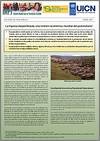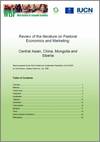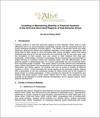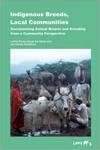Le pastoralisme mobile est la manière la plus durable de gérer les pâturages du monde, et les utilisations alternatives de la terre viennent avec des coûts environnementaux et économiques. L’ampleur de ces coûts n’est pas encore bien connue, et ils peuvent être encourus à l’insu de beaucoup de personnes. Si les pays disposant de pâturages importants désirent inverser la désertification et arriver à bout de la pauvreté, alors il est crucial de reconnaitre la logique environnementale du pastoralisme mobile et son important potentiel économique.
Year of publication: 2007Organization: Union internationale pour la conservation de la nature (IUCN)
Topic: Économie
Language: 中文, English, Français, Español
Type of document: Politiques et législation
Geographical coverage: Global
Cette revue de la littérature sur l'économie pastorale est une contribution à la prise de conscience mondiale sur l'importance du pastoralisme mobile en tant que forme de gestion productive et durable des terres. Cette revue vise à mettre en lumière le savoir existant quant à la valeur du pastoralisme, les lacunes liés à ce savoir, les tendances dans les économies pastorales, et les options politiques pouvant appuyer le plus efficacement possible les économies des milieux arides.
Year of publication: 2006Organization: Union internationale pour la conservation de la nature (IUCN)
Topic: Économie
Language: English, Français, Español
Type of document: Technique
Geographical coverage: Global
Eight regional studies were carried out in the context of the Global review of the economics of pastoralism. The studies identify how pastoralism contributes to domestic and global markets in different regions. The studies capture the following regions: Horn of Africa and Southern Africa; West Africa; Eastern Africa; Northern Africa; South America; Asia; Middle East; and Europe.
Year of publication: 2006Organization: Union internationale pour la conservation de la nature (IUCN)
Topic: Économie
Language: English
Type of document: Technique
Geographical coverage: Amérique du nord, Amérique Latine, Europe, Proche-Orient, Afrique du Nord, Afrique occidentale, Afrique centrale, Afrique orientale, Afrique australe, Asie centrale, Asie du Sud
Nombre de législateurs en Afrique de l’Est ont des préjugés quant à la valeur du pastoralisme en tant que système d’utilisation des terres et le considèrent comme étant économiquement inefficace et néfaste pour l’environnement. Pourtant, cela ne s’appuie aucunement sur des preuves. Non seulement il n’existe pas de consensus quant au modèle économique dynamique du pastoralisme, mais encore il n’existe pas de dispositif pour informer la prise de décision du gouvernement quant aux avantages qu’il présente par rapport à d’autres utilisations des terres. Pour estimer la valeur du pastoralisme, il faut un nouveau cadre conceptuel qui sache dépasser les critères économiques classiques afin de fournir un nouvel aperçu de sa contribution à la réduction de la pauvreté, à la gestion durable de l’environnement et au développement économique des zones arides d’Afrique de l’Est dans un contexte d’incertitudes climatiques toujours croissantes. Cet article propose un tel cadre.
Year of publication: 2006Organization: Institut international pour l'environnement et le développement (IIED)
Topic: Économie, Value addition
Language: English, Français
Type of document: Technique
Geographical coverage: Afrique orientale
This paper seeks to provide national and international policy-makers interested in the development of arid and semi-arid areas with background information and policy options, on whether and how to invest in mobility of pastoral systems in Africa. It first describes the trends leading to declining mobility, followed by a description of the key underlying causes for these trends and their impacts on mobile pastoralists. It then provides the rationale for investments and concludes with policy options which policy-makers face when deciding on priorities to be allocated to overall pastoral development, and to specific actions within pastoral development.
Year of publication: 2006Organization: Organisation des Nations Unies pour l'alimentation et l'agriculture (FAO)
Topic: Économie, Value addition
Language: English
Type of document: Technique
Geographical coverage: Afrique occidentale, Afrique centrale, Afrique orientale, Afrique australe
This toolkit gathers together information on 10 tools that have been successfully used by members of the International Land Coalition (ILC) to promote, protect, and strengthen the land rights of Indigenous Peoples and local communities. It is intended to facilitate mutual learning based on the good practices of specific ILC members. The opportunity to share knowledge is one of the main benefits of being part of a network like the ILC. Use these tools, adapt them to your specific context, share them with your partner organisations, and share with us your achievements and successes!
Year of publication: 2005Organization: Coalition internationale pour l’accès à la terre (ILC)
Topic: Conflit, Services environnementaux, Peuples autochtones, Régime foncier, Participation
Language: English
Type of document: Technique
Geographical coverage: Global
The collection of research presented in this brief explores the roles of collective action and property rights in influencing incentives for rangeland management. The underlying premise is that collective action and property rights are important for the sustainable management of rangelands, watersheds and for technological innovation and adoption. Investments in rangelands restoration requires that individuals and groups are assured of long-term security to the use of the resource, and the necessary authority to protect their restored rangeland. At the same time, research presented here also highlights the role of both external and internal factors in influencing the evolution of property rights and the collective capacities of groups to manage natural resources within the context of environmental variability. Both dimensions of research provide a deeper reflection on how policies can be crafted to enhance rural livelihoods while sustaining the rangeland resource base.
Year of publication: 2005Organization: Groupe consultatif pour la recherche agricole internationale
Topic: Économie, Sécurité alimentaire, Peuples autochtones, Régime foncier
Language: English
Type of document: Technique
Geographical coverage: Afrique occidentale, Afrique orientale, Global
This book was inspired by our interaction with the Raika, the traditional livestock breeders of Rajasthan. From them we learned about the relationships between humans, animals and the environment that shape livestock genetic resources and generate indigenous breeds. This publication provides a welcome opportunity to redress some of the common misperceptions about indigenous livestock breeders. It describes the threats to these breeds of livestock and how to document them as a first step in conserving them in collaboration with the communities where they evolved.
Year of publication: 2005Organization: Ligue des peuples pasteurs (LPP),
Topic: Services environnementaux, Les savoirs autochtones, Participation
Language: English
Type of document: Technique
Geographical coverage: Asie du Sud








